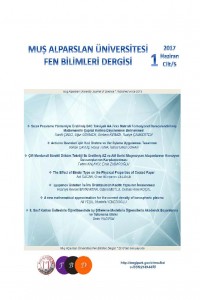Öz
Herhangi
bir ortamda iletkenik ve elektrik alana bağlı olan akım yoğunluğu dünyadan
iyonosfere gönderilen herhangi bir elektromanyetik dalga için iyonosferik
plazmanın bir bölgesinde çok önemlidir. Bundan dolayı, biz ionosferik akım
yoğunluğu için yeni bir matematiksel methot geliştirdik ve iyonosferik plazmada
dokuz bileşene sahip olan iletkenlik tensörünü diagonal hale
getirdik.İletkenlik tarafından meydana gelen akım youğunlukları değişimleri
matematiksel olarak gösterdik. Bu metot akım younluğunun yönünü ve
iletkenlikten kaynaklanan akımın büyüklüğünün nekadar olabileceğini kesin bir
şekilde belirleyecektir. Bunun yanısıra, bu yaklaşım iyonosferik plazma çalışmaları için gelecekte iyi bir model olacaktır. Özellikle
iletenklik, diffüzyon ve termal iletkenlik çalışmaları için.
Anahtar Kelimeler
Kaynakça
- [1] Aydogdu, M. ve Ozcan, O., (1996). Effect of magnetic declination on refractive index and wave polarization coefficients of electromagnetic wave in mid-latitude ionosphere, Indian Journal of radio & space science 25, 263-70.
- [2] Aydogdu, M., Ozcan, O., (2001). The possible effects of the magnetic declination on the wave polarization coefficients at the cutoff point. Progress in Electromagnetic Research, PIER 30, 179–190. Abstract Journal of Electromagnetic Waves and Applications, 14, 1289–1290,
- [3] Aydoǧdu, M., Yeşıl, A., and Güzel, E. (2004). The group refractive indices of HF waves in the ionosphere and departure from the magnitude without collisions. Journal of atmospheric and solar-terrestrial physics, 66(5), 343-348.
- [4] Bittencourt, J. A. (2013). Fundamentals of plasma physics. Springer Science & Business Media.
- [5] Rishbeth, H. ve Garriot, O.K., 1969. Introduction to Ionospheric Physics, Academic Pres, New York, 175-186
- [6] Rishbeth, H., 1973. Physics and Chemistry of The Ionospheric Contemp, Phys, 14,229, 240.
- [7] Sagir, S., Atici, R., Ozcan, O., Yüksel, N. (2015a). The effect of the stratospheric QBO on the neutral density of the D region. Ann.Geophys., 58(3), A0331.
- [8] Sagir, S., Karatay, S., Atici, R., Yesil, A., & Ozcan, O. (2015b). The relationship between the Quasi Biennial Oscillation and Sunspot Number. Advances in Space Research, 55(1), 106-112.
- [9] Sagi, S., Yesil, A., Sanac, G., & Unal, I. (2014). Thecharacterization of diffusion tensor for mid-latitude ionospheric plasma. Annals of Geophysics, 57(2), A0216.
- [10] Yeşil, A., Sağır, S., ve Kurt, K. The Behavior ofthe Classical Diffusion Tensor for Equatorial Ionospheric Plasma. Journal of Science, 13, 123.
- [11] Kurt K., Yeşil A., Sağır S., Atıcı R., 2016: The Relationship of Stratospheric QBO with the Difference of Measured and Calculated NmF2. Acta Geophys. 64, DOI: 10.1515/acgeo-2016-0061.
- [12] Yesil A.,Sagir, S., Ozcan, O., 2009. Comparison of maximum electron density predicted by IRI-2001 with that measured over Chilton station. E-Journal of New World Sci. Acad. 4(3), 92-99.
Öz
The
current density depending upon conductivity and electric field in any medium is
very important in any region of ionosphere plasma especially for an electro-magnetic
wave sending from Earth to ionosphere. Due to this, we build up new
mathematical method for ionospheric current density and rendered diagonal case
of the conductivity tensor possessing nine components in ionosphere plasma and
the current density changes formed by conductivity has been shown mathematically.
This method will precisely determine the direction of current and how much the
magnitude of current resulting from conductivity will be able to create.
Besides, this approximation will be created a good model
for future work in ionosphere plasma, especially conductivity, diffusion and
thermal conductivity.
Anahtar Kelimeler
Kaynakça
- [1] Aydogdu, M. ve Ozcan, O., (1996). Effect of magnetic declination on refractive index and wave polarization coefficients of electromagnetic wave in mid-latitude ionosphere, Indian Journal of radio & space science 25, 263-70.
- [2] Aydogdu, M., Ozcan, O., (2001). The possible effects of the magnetic declination on the wave polarization coefficients at the cutoff point. Progress in Electromagnetic Research, PIER 30, 179–190. Abstract Journal of Electromagnetic Waves and Applications, 14, 1289–1290,
- [3] Aydoǧdu, M., Yeşıl, A., and Güzel, E. (2004). The group refractive indices of HF waves in the ionosphere and departure from the magnitude without collisions. Journal of atmospheric and solar-terrestrial physics, 66(5), 343-348.
- [4] Bittencourt, J. A. (2013). Fundamentals of plasma physics. Springer Science & Business Media.
- [5] Rishbeth, H. ve Garriot, O.K., 1969. Introduction to Ionospheric Physics, Academic Pres, New York, 175-186
- [6] Rishbeth, H., 1973. Physics and Chemistry of The Ionospheric Contemp, Phys, 14,229, 240.
- [7] Sagir, S., Atici, R., Ozcan, O., Yüksel, N. (2015a). The effect of the stratospheric QBO on the neutral density of the D region. Ann.Geophys., 58(3), A0331.
- [8] Sagir, S., Karatay, S., Atici, R., Yesil, A., & Ozcan, O. (2015b). The relationship between the Quasi Biennial Oscillation and Sunspot Number. Advances in Space Research, 55(1), 106-112.
- [9] Sagi, S., Yesil, A., Sanac, G., & Unal, I. (2014). Thecharacterization of diffusion tensor for mid-latitude ionospheric plasma. Annals of Geophysics, 57(2), A0216.
- [10] Yeşil, A., Sağır, S., ve Kurt, K. The Behavior ofthe Classical Diffusion Tensor for Equatorial Ionospheric Plasma. Journal of Science, 13, 123.
- [11] Kurt K., Yeşil A., Sağır S., Atıcı R., 2016: The Relationship of Stratospheric QBO with the Difference of Measured and Calculated NmF2. Acta Geophys. 64, DOI: 10.1515/acgeo-2016-0061.
- [12] Yesil A.,Sagir, S., Ozcan, O., 2009. Comparison of maximum electron density predicted by IRI-2001 with that measured over Chilton station. E-Journal of New World Sci. Acad. 4(3), 92-99.
Ayrıntılar
| Konular | Mühendislik |
|---|---|
| Bölüm | Araştırma Makalesi |
| Yazarlar | |
| Yayımlanma Tarihi | 1 Haziran 2017 |
| Yayımlandığı Sayı | Yıl 2017 Cilt: 5 Sayı: 1 |


